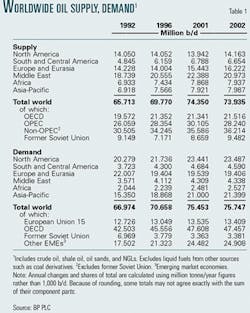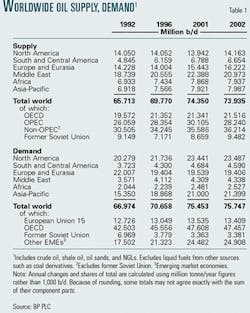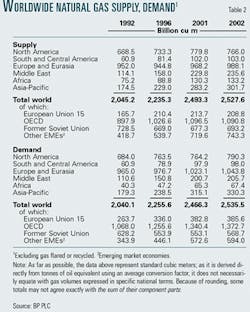Global energy demand up 'well ahead' of 10-year trend
Global energy consumption increased by 2.6% in 2002 vs. the year before, "well ahead" of the 10-year trend of 1.4%/year. Worldwide oil production capacity, meanwhile, "comfortably exceeds" world demand and world oil supplies are "becoming more diverse," reported Peter Davies, BP PLC chief economist, in BP's Statistical Review of World Energy 2003.
BP's annual report, released June 10, said that as a result of these factors, "producers were able to meet the needs of oil consumers during the Iraq war and during unplanned supply disruptions in Venezuela and Nigeria." As a further consequence of this, Davies added, "Consuming nations were not required to tap their emergency reserves. This is good news for those concerned about energy security, but it should not lead to complacency."
During the war on Iraq, Davies noted, the Organization of Petroleum Exporting Countries used its spare capacity of nearly 4 million b/d "to keep the market supplied," although the organization cut its average output by 1.87 million b/d "in response to weak global oil demand and a 1.45 million b/d increase in non-OPEC production." He added that OPEC production has declined in 3 of the last 4 years.
"The story is one of supply momentum that looks set to continue," Davies said. "Russian oil production is up 25% in 3 years and Russia has been joined by a new group of oil producing basins, across several continents and regions, that have begun to grow rapidly," he added.
Oil prices, supply, demand
Brent oil prices averaged $25.19/bbl in 2002, according to BP, which was up only slightly from 2001's average price of $24.77/bbl. This price, however, was "well above" the post-1986 yearly average of $19.40/bbl, BP reported. "Prices during 2002 ranged from a low of around $18/bbl in mid-January to peak just before the end of the year at $32(/bbl)," the report said.
Global oil demand, meanwhile, was "broadly flat," BP said, increasing by 290,000 b/d to 75.7 million b/d. "All of the increase is attributable to China, where oil consumption increased 5.8%, or 332,000 b/d," BP said.
Global oil supply declined by 415,000 b/d, or 0.7%, to 73.9 million b/d from 74.4 million b/d, BP reported. "OPEC daily oil production fell to 28.2 million b/d, a drop of 1.87 million b/d (6.4%). The steep fall resulted from a number of unplanned disruptions and because some OPEC producers, primarily Saudi Arabia, curtailed production in response to weak demand and to a significant 1.45 million b/d increase in non-OPEC oil output," BP said. Some of the more substantial production increases, BP reported, occurred in Russia 640,000 b/d, Kazakhstan 150,000 b/d, Canada 170,000 b/d, Angola 160,000 b/d, and Brazil 160,000 b/d.
In 3 years' time, oil production from Russia, the Caspian Sea, and from the deepwater Atlantic Basin and Canada has increased 3.3 million b/d, or 26.5%, "and has the potential to increase another 5 million b/d by 2007," the report said.
China, meanwhile, accounted for 68.5% of the increase in global primary energy consumption in 2002 and has become a "major energy consumer and importer," according to BP's report. "Consumption of coal, which accounts for 66% of Chinese energy use, grew a massive 27.9%. Oil consumption increased 5.8%, or 332,000 b/d, accounting for all of the world's oil consumption growth in 2002," BP reported, adding, "China replaced Japan as the world's second largest oil consumer."
Natural gas supply, demand
Global demand of gas increased in 2002 by a "relatively strong 2.8%," BP reported. This increase was "on the strength of a 3.9% increase in US consumption and a 7% increase in non-OECD Asia-Pacific consumption," the company said. "Growth in natural gas consumption outpaced growth in world primary energy, and its share of total energy consumption is now roughly equal to coal at 24%," BP reported.
Global gas production, meanwhile, increased 1.4%, to 2,527 billion cu m (bcm) from 2,493 bcm, the report said. "North America was the only region to experience a production decline, falling 1.8% to 766 bcm from 779 bcm. A price-driven drop in drilling activity explains some of the production decrease, but the maturity of US and Canadian gas producing basins was also a factor," BP noted.
"Natural gas is the world's preferred nontransport fuel. Outside the former Soviet Union, gas consumption has grown 3.4%/year over the past decade, and its share of total energy consumption is now roughly equal to coal at 24%," the report said.
Consumption of gas in the US increased 3.9% in 2002 "as North American gas production fell 1.8%," BP said. "Imported LNG is filling part of the gap. Producers are now considering options for delivering new sources of pipeline gas and LNG to this growing gas market," BP reported.
Other energy sources
Coal was "the fastest-growing fuel in 2002," BP said, with consumption of the fuel rising 6.9% during last year. This increase was "on the strength of an extraordinary reported increase in China of 27.9%," BP said. Excluding China, world consumption of coal "increased just 0.6%," BP said.
Nuclear power demand, meanwhile, rose 1.5%, "with most of the increase coming in Asia," BP said. "World consumption of hydroelectric power increased 1.3% from 2001 but was still less than in 2000," the report said, adding, "Nuclear and hydroelectric power each account for about 6% of total world energy consumption."


